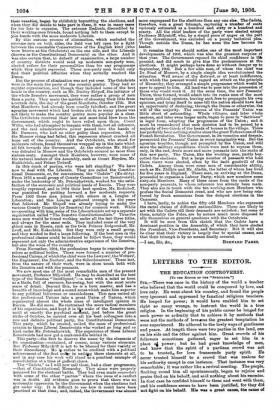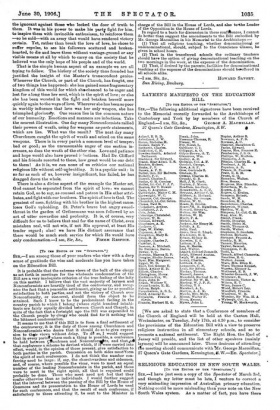LETTERS TO THE EDITOR.
THE EDUCATION CONTROVERSY.
[To THE EDITOR OP TER "SPECTATOR."] Sin,—There was once in the history of the world a teacher who believed that the world could be conquered by love, and love only. He went about his country, and found the people very ignorant and oppressed by fanatical religious teachers. He longed for power; it would have enabled him to set right so many wrongs, to instruct the world in a true religion. In the beginning of his public career he longed for such power so ardently that to achieve it by methods that were not the methods of love .vas the greatest temptation he ever experienced. He adhered to the lowly ways of gentleness and peace. At length there were two parties in the land, one on his side and the other against him. Great crowds of his followers sometimes gathered, eager to set him in a place esi power ; but he had great knowledge of men, and knew that the spirit of a partisan crowd was not to be trusted,. for love transcends party spirit. He never trusted himself to a crowd that was zealous for his authority except in one instance. That instance was very remarkable ; it was rather like a revival meeting. The people, flocking round him all spontaneously, began to rejoice and praise God on his behalf, and said nothing about his enemies. In that case he confided himself to them and went with them, and his confidence seems to have been justified, for they did not fight on his behalf. His was a great cause, the cause of the ignorant against those who locked the door of truth to them. It was in his power to make his partir fight for him, to inspire them with invincible enthusiasm, to reinforce them —so he said—with an army that would have rendered victory certain. Yet, rather than break the love of love, he chose to suffer repulse, to see his followers scattered and broken. hearted, to die and leave them without vantage-ground or any visible means at all by which to carry on the society that he believed was the only hope of his people and of the world.
That is the simple human aspect of an example we are all trying to follow. The history of the society thus founded has justified the insight of the Master's transcendent genius. Whenever the Church, or part of the Church, has fought, one of two things has happened: she has gained some fragmentary kingdom of this world for which shochanced to be eager and lost for along time her soul, which is the spirit of love; or else she has been worsted in the fight and betaken herself more quickly again to the ways of love. Wherever she has been so poor in worldly influence that love was her only weapon, she has triumphed gloriously. One reason lies in the common nature of our humanity. Emotions and manners are infectious. Take the nearest illustration. One day many Nonconformists rallied their powers of wrath, using for weapons ex-parte statements, which are lies. What was the result? The next day many Churchmen caught the spirit of wrath and seized on the same weapons. There is in every parish a common level of temper, bad or good; as the unreasonable anger of one section in- creases, so does the wrath of the other rise. Love and patience and hope would also have proved ir f'ectious. Had Dr. Clifford _and his friends resorted to these, how great would be our debt to them As it is, we can none of us criticise our national religious life without self-nbraiding. It is a psychic unit : in so far as each of us, however insignificant, has failed, he has dragged down the whole.
There is also a divine aspect of the example the Master set, God cannot be separated from the spirit of love : we cannot retain God, so to say, as counsel and patron in His other attri- butes, and fight with our brothers. The spirit of love is God. The greatest of men, fighting with his brother in the highest cause, loses God's upholding. St. Peter's brave but angry sword- thrust in the garden of Gethsemane was soon followed by an act of utter cowardice and profanity. It is, of course, very difficult for us to believe that zeal for the name of Christ, even mistaken zeal, will not win, if not His approval, at least His tender regard; alas! we have His distinct assurance that there would be much such service for which He would have
only condemnation.—I am, Sir, Sic., Firm! REsrreE.



























































 Previous page
Previous page